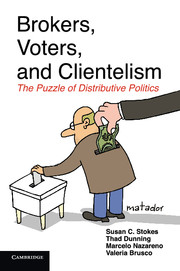Book contents
- Frontmatter
- Dedication
- Contents
- List of Tables
- List of Figures
- Preface and Acknowledgments
- I MODALITIES OF DISTRIBUTIVE POLITICS
- II THE MICRO-LOGIC OF CLIENTELISM
- III THE MACRO-LOGIC OF VOTE BUYING: WHAT EXPLAINS THE RISE AND DECLINE OF POLITICAL MACHINES?
- IV CLIENTELISM AND DEMOCRATIC THEORY
- Appendix A: Argentina Brokers' Survey
- Appendix B: Argentina Voters' Surveys
- Appendix C: Venezuela Voters' Survey and the Maisanta Database
- Appendix D: India Voters' Survey
- References
- Index
- Miscellaneous Endmatter
Appendix B: Argentina Voters' Surveys
Published online by Cambridge University Press: 05 June 2014
- Frontmatter
- Dedication
- Contents
- List of Tables
- List of Figures
- Preface and Acknowledgments
- I MODALITIES OF DISTRIBUTIVE POLITICS
- II THE MICRO-LOGIC OF CLIENTELISM
- III THE MACRO-LOGIC OF VOTE BUYING: WHAT EXPLAINS THE RISE AND DECLINE OF POLITICAL MACHINES?
- IV CLIENTELISM AND DEMOCRATIC THEORY
- Appendix A: Argentina Brokers' Survey
- Appendix B: Argentina Voters' Surveys
- Appendix C: Venezuela Voters' Survey and the Maisanta Database
- Appendix D: India Voters' Survey
- References
- Index
- Miscellaneous Endmatter
Summary
This Appendix describes the sampling design and other aspects of the survey methodology for three different surveys we took of Argentine voters in the years 2001, 2003, and 2009.
B.1 2001 SURVEY
Our first surveys of Argentine voters took place in December 2001 and January 2002. We used multistage cluster sampling techniques, based on census tracts, to select a probability sample of 1,920 voters, in the provinces of Buenos Aires, Córdoba, and Misiones and including an oversample from the area of Mar del Plata in Buenos Aires province. There were 480 adults selected in each of the four areas, giving an overall margin of error of plus or minus 4.5 percent.
The survey allowed us to explore the strategies of clientelist parties indirectly, by revealing what kinds of voters these parties target and who among the voters are responsive to private rewards. Respondents were asked a variety of questions, for instance, whether they had received any goods from a political party during the election campaign that had taken place two months earlier, what kinds of goods they had received, whether respondents believed that receiving goods had influenced their vote, whether the person had turned to a locally important political actor for help during the past year, and whether, if the head of their household lost his or her job, the family would turn to a party operative for help (Job). See Stokes 2005 for further description of sampling design and survey questions.
- Type
- Chapter
- Information
- Brokers, Voters, and ClientelismThe Puzzle of Distributive Politics, pp. 279 - 280Publisher: Cambridge University PressPrint publication year: 2013



